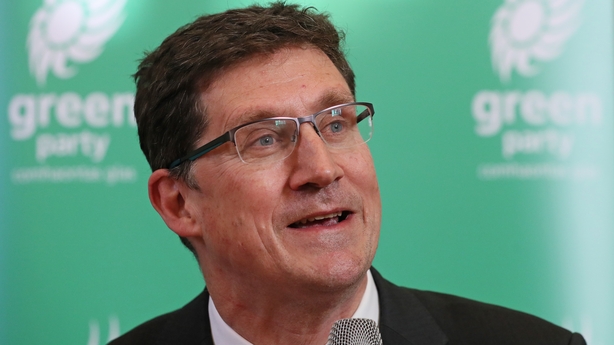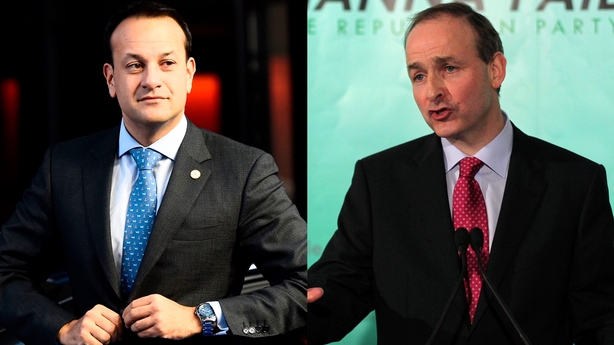The Government is running out of road. Eleven weeks on from the election, the absence of a newly-mandated administration is causing problems.
Initially, the Government's handling of the coronavirus crisis was lauded. They moved quickly and communicated decisions effectively.
But there is now a distinct sense of drift, especially in the lapses in safeguarding nursing homes. And healthcare workers still don't have childcare despite being repeatedly promised a solution.
Other problems are also looming.
The Department of Social Protection will hit a spending limit by June. More money requires a new set of estimates to be voted on by the Dáil but it's not clear whether this would be legally sound without a new government in place.
All this underlines the necessity for urgency in government formation which has moved so slowly until now.
The big play this week came from the Green Party – now the prime target of a Fianna Fáil-Fine Gael coalition in search of a third party.
Its list of 17 demands elicited emollient responses from Fianna Fáil leader Micheál Martin and Fine Gael Minister Josepha Madigan. Both stressed the common ground and constructive approach.
But there was some fuzziness on whether these 17 demands were preconditions for talks or opening positions for negotiation.

Green Party leader Eamon Ryan seemed to initially say they were all red lines but later moved to suggest that the only absolute definite is the required commitment to reduce greenhouse gas emissions by at least 7% per year.
This, however, is a massive leap - double the current target. It's the detail of how you reach such a threshold that is vexing.
Renewable energy and heating initiatives may be uncontroversial although costly, but moves to drastically reduce emissions from agriculture are politically much more difficult.
The size of the national herd is cherished by farmers. Potentially placing this on the negotiating table sets off alarm bells for many rural deputies.
So this is a problem for both Fianna Fáil and Fine Gael and also many of the independents they hope to attract.
Roscommon Galway TD Denis Naughten, the convenor of the Regional Technical Group, was unequivocal in dismissing the target as unachievable.
And he went further in moving his group's position from insisting on a third party for cohesion, to saying it was now time to move on with independents alone.
Some in Fianna Fáil and Fine Gael have questioned this reversal as perhaps being explained by the reality that the bigger the coalition, the fewer ministries that are available.
Another sticking point in the document has gone somewhat under the radar.
Renewable energy and heating initiatives may be uncontroversial although costly, but moves to drastically reduce emissions from agriculture are politically much more difficult. The size of the national herd is cherished by farmers. Potentially placing this on the negotiating table sets off alarm bells for many rural deputies.
The Green Party wants an end to the importation and construction of liquified natural gas (LNG) infrastructure. This is an immediate issue in Kerry where a LNG terminal is planned for the Shannon estuary at Ballylongford.
Local Fianna Fáil deputy Norma Foley has already said she would oppose any effort to halt its construction.
Beyond these thorny issues, many in the two parties see the Green list as eminently doable.
They point out that some elements are fairly uncontroversial, while others have already been agreed, such as a commitment to reach the UN overseas aid target. In addition, a roadmap to ending direct provision is likely in any programme for government.
Elsewhere, the other targets of Fianna Fáil and Fine Gael’s affections – the Social Democrats and Labour – appear to be retreating.
In Labour, the mood is solidifying that now is the time to rebuild in opposition under a new leader. TDs believe they can carve out some space there, albeit in the shadow of Sinn Féin.
This was exemplified by leader Alan Kelly’s effective Dáil contribution this week, querying the power now resting with the National Public Health Emergency Team and its lack of transparency.
Meanwhile, the Social Democrats appear to be stringing out the process. The party asked for much more detail on financial projections.
However, it seems the 72-page Stability Programme Update, with its independently-endorsed dire forecasts, was not enough.

So the hopes of Fianna Fáil and Fine Gael very much rest on the Green Party.
The tussle now is on agreeing a basis for entering negotiations that can bring the Green parliamentary party on board with an eye to satisfying its membership who have to approve any eventual deal.
From the Green perspective, Eamon Ryan must extract a high price. For the other parties, they must find a political way to give ground on achievable targets.
There remains a rump of Fianna Fáil members who would prefer a deal with Sinn Féin. However, Micheál Martin remains vehemently opposed to such a move, so a major pivot in position would necessitate a change of leader.
The feeling is that if this was going to happen, the time was several weeks ago after a fractious parliamentary party meeting.
So it's game on for the Greens in government with all eyes on the meeting in the coming days between Eamon Ryan on one side and Leo Varadkar and Micheál Martin on the other.





